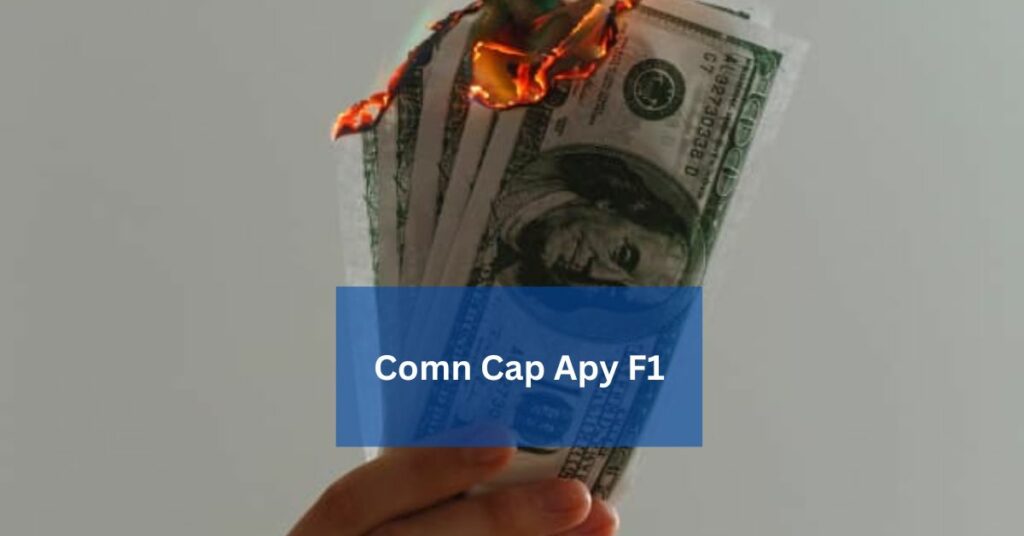Comn Cap Apy F1 – Decoding Your Bank Statement!

In today’s digital banking world, understanding the short forms and codes on your bank statement can be like figuring out a tricky puzzle. One of these confusing terms you might see is “COMN-CAP-APY-F1.”
“COMN-CAP-APY-F1” likely refers to a recurring charge on your bank statement, indicating an automated payment made through the Automated Clearing House (ACH) network to a credit card issued by Comenity Capital Bank.
While it may seem daunting at first glance, breaking it down into its constituent parts reveals its significance in understanding your financial transactions.
What is ACH?
Automated Clearing House (ACH) is the backbone of electronic payments and money transfers in the United States. It facilitates the seamless movement of funds between bank accounts, enabling transactions such as direct deposits, bill payments, and online transfers.
Decoding COMN-CAP-APY:
COMN: Short for Comenity, likely referring to Comenity Capital Bank, a financial institution that issues credit cards and provides banking services.
CAP: The abbreviation for Capital indicates the financial aspect of Comenity Capital Bank’s operations.
APY: Stands for AutoPay, a feature that automates the process of transferring funds from your bank account to pay for recurring charges, such as credit card bills.
Understanding F1:
The “F1” component of the code represents a specific store or credit card. In the context of Comenity Capital Bank, F1 may denote a particular credit card issued by the bank, such as the Ulta credit card.
Why Does It Appear on Your Statement?
The presence of “COMN-CAP-APY-F1” on your bank statement signifies a recurring payment made through the Automated Clearing House network to a credit card issued by Comenity Capital Bank.
This could include monthly credit card payments, installment plan charges, or subscription fees associated with your account. By automating these transactions through AutoPay, you can streamline your bill payment process and avoid the hassle of manual payments each month.
Getting To Know Comenity Capital Bank – Unveiling Comn Cap Apy F1 Financial Powerhouse:
Comenity Capital Bank might not be a household name, but it plays a significant role in the world of consumer finance. Understanding who they are and what they do can provide valuable insight into the financial services industry and how it impacts consumers.
Overview of Comenity Capital Bank:
Comenity Capital Bank is a financial institution that specializes in providing credit cards and banking services to consumers across the United States. Established in 2003, the bank operates as a subsidiary of Alliance Data Systems Corporation, a leading provider of data-driven marketing and loyalty solutions.
Services Offered:
Comenity Capital Bank primarily focuses on issuing branded credit cards in partnership with various retailers, brands, and organizations. These credit cards often come with rewards programs, special discounts, and exclusive offers tailored to the specific needs and preferences of the cardholders.
Additionally, Comenity Capital Bank offers traditional banking services, including savings accounts, certificates of deposit (CDs), and online banking tools to manage accounts conveniently.
Partnerships and Affiliations:
One of Comenity Capital Bank’s key strategies is forming partnerships with retailers, brands, and other businesses to offer co-branded credit cards. These partnerships allow businesses to enhance customer loyalty, drive sales, and expand their reach while also providing consumers with additional purchasing power and benefits.
Comenity Capital Bank’s extensive network of partners spans various industries, including retail, fashion, beauty, home furnishings, and more. Some well-known brands associated with Comenity Capital Bank include Victoria’s Secret, Ulta Beauty, Wayfair, and GameStop, among others.
Credit Card Offerings:
Comenity Capital Bank’s credit card offerings cater to a diverse range of consumer preferences and lifestyles. Whether you’re a frequent shopper at a specific store, a loyal customer of a particular brand, or seeking rewards and perks for everyday spending, there’s likely a Comenity Capital Bank credit card tailored to your needs.
These credit cards may feature benefits such as cashback rewards, points for purchases, introductory offers, and special financing options. Additionally, cardholders may enjoy exclusive access to sales events, birthday rewards, and personalized offers based on their shopping habits and preferences.
Can I Dispute This Charge? – Understanding Your Rights and Options
Recognizing Unauthorized Transactions:
Before initiating a dispute, carefully review your bank statement to identify any unauthorized or fraudulent charges. Look for transactions that you didn’t authorize or recognize, as well as any discrepancies in the amounts charged.
Understanding Your Rights:
As a consumer, you have rights protected by federal law, such as the Electronic Fund Transfer Act (EFTA) and the Fair Credit Billing Act (FCBA). These laws outline your rights and responsibilities concerning electronic fund transfers and credit card billing disputes.
Initiating the Dispute Process:
If you believe a charge on your bank statement is incorrect or unauthorized, promptly contact your bank or credit card issuer to initiate the dispute process. Most financial institutions provide a toll-free number or online portal for reporting and resolving disputes.
Gathering Documentation:
Gather any supporting documentation related to the disputed transaction, such as receipts, invoices, or correspondence with the merchant. This information will strengthen your case during the dispute investigation.
Submitting a Dispute:
Follow your bank’s specific instructions for submitting a dispute, which may include providing details about the transaction, explaining why you’re disputing it, and providing any relevant documentation. Be thorough and concise in your communication to expedite the resolution process.
Investigating the Dispute:
Upon receiving your dispute claim, your bank will conduct an investigation to determine the validity of the charge. This may involve contacting the merchant, reviewing transaction records, and assessing the evidence provided.
Resolution and Outcome:
Once the investigation is complete, your bank will notify you of the outcome and any adjustments to your account. If the charge is deemed unauthorized or erroneous, you’ll typically receive a refund or credit for the disputed amount.
FAQs:
1. What is the significance of COMN-CAP-APY-F1 on my bank statement?
COMN-CAP-APY-F1 indicates an automated payment made through the Automated Clearing House network to a credit card issued by Comenity Capital Bank. It signifies a recurring charge, likely associated with a specific credit card account.
2. How can I track my transactions with COMN-CAP-APY-F1?
You can monitor your transactions by reviewing your bank statements regularly. Look for the COMN-CAP-APY-F1 code alongside the corresponding amount debited from your account. Additionally, accessing your online banking portal or mobile app allows for real-time tracking of transactions.
3. Can I opt out of AutoPay (APY) for my credit card payments?
Yes, most banks and credit card issuers offer the option to disable AutoPay for your account. Contact your financial institution’s customer service or log in to your online banking portal to adjust your payment settings according to your preferences.
Conclusion:
Understanding what ACH-COMN-CAP-APY-F1 means on your bank statement helps you know how your money moves automatically. It’s like solving a puzzle about how your payments work. Knowing what each part of the code means helps you manage your money better, see where it goes, and ensure you’re in charge of your finances.
If you see any strange words or payments on your bank statement, ask your bank to explain. They’re there to help you understand and stay in control of your money.
Read:



